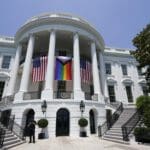Civil rights group asks Supreme Court to ban LGBTQ discrimination at food banks
Another major LGBTQ rights case will head to the Supreme Court next term.

The Supreme Court is set to hear another case that could have major implications for LGBTQ rights.
This case, Fulton v. City of Philadelphia, hinges on whether private agencies that receive taxpayer funding, including food banks, homeless shelters, and foster care providers, can decide not to provide services to LGBTQ people for religious reasons, as well as other groups that may not meet their religious standards, such as Jews and Muslims.
The nation’s highest court will hear oral argument on the issue next term, though an exact date has not been scheduled.
The American Civil Liberties Union has filed a brief asking the court to rule against what it calls “a license to discriminate in taxpayer-funded services” according to an email statement on Friday. Plaintiffs in the case have claimed that free speech and free exercise of religion have empowered those services to reject same-sex families.
In Fulton, a group of foster parents and Catholic Social Services has challenged Philadelphia’s policy to stop referrals of foster children to the organization because it refused to certify same-sex couples as foster parents in 2018. The organization was represented by Becket Fund for Religious Liberty, which served as counsel in Burwell v. Hobby Lobby Stores, the landmark Supreme Court decision that ruled businesses could be exempt from regulations they objected to on religious grounds.
Since 2018, Fulton has bounced around the lower courts. Last year, the Third Circuit upheld a district court ruling that denied the social services organization’s motion for a preliminary injunction. In February, the Supreme Court announced it would hear arguments in the case.
The ACLU became involved in 2018 when it filed a motion to intervene in the lawsuit for two organizations, Philadelphia Family Pride and Support Center for Child Advocates, that said its members and the people they served would be harmed by a ruling in favor of Catholic Social Services.
Philadelphia Family Pride is nonprofit that focuses on LGBTQ people and their families and Support Center for Child Advocates is a nonprofit that advocates for children in the foster care system.
Leslie Cooper, deputy director of the ACLU LGBT & HIV Project, said this case is bigger than discrimination in foster care and could extend to anti-LGBTQ discrimination in other services.
“While this specific case is about foster care, the reality is that LGBTQ people, like all people, use a wide range of government services, including food banks, homeless shelters and health care services,” she said. “If the City of Philadelphia is forced to give taxpayer dollars to an agency that will discriminate, it opens the door to discrimination in any of those services.”
This year, the Supreme Court has made decisions in other cases affecting the rights of LGBTQ people. In June, the court made a historic decision in Bostock v. Clayton County, ruling that the Civil Rights Act of 1964, which bars employment discrimination based on sex, also prohibits discrimination against LGBTQ people.
A July decision in Our Lady of Guadalupe School v. Morrissey-Berru said religious employers have a “ministerial exception,” which gives them more freedom to make decisions about their workers than other employers and organizations. LGBTQ groups said that decision could be used against LGBTQ teachers and other LGBTQ people employed by religious institutions.
Cooper said that the Fulton v. City of Philadelphia case reflects a mission from people fighting against LGBTQ rights to get around the progress queer and trans people have made in nondiscrimination protections on the state and federal level.
“For decades, those opposed to LGBTQ equality worked to prevent the law from fully recognizing who we are and our families. Now that our laws reflect that no one should experience discrimination for being LGBTQ, there are those who are trying to undermine our nondiscrimination laws by saying the law does not apply to them.” she said.
Published with permission of The American Independent Foundation.
Recommended

Alaska House committee advances, expands proposal to bar trans girls from girls sports
Amended bill would add elementary, middle school and collegiate sports to limits in place for high school
By Claire Stremple, Alaska Beacon - April 16, 2024
Bills targeting trans people are on the rise nationwide and in Alaska — most focus on children
House committee advances legislation that would restrict the rights of Alaska trans kids
By Claire Stremple, Alaska Beacon - April 01, 2024
Anti-abortion, anti-LGBTQ resolutions to be voted on at state Republican convention
A resolution to be considered by North Dakota Republican Party delegates at their upcoming convention would define life as beginning at fertilization and call for criminal penalties for “anyone who kills a pre-born human being.”
By Michael Achterling, North Dakota Monitor - March 26, 2024









































































